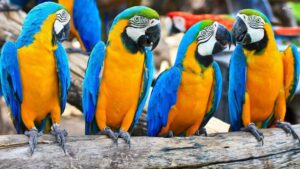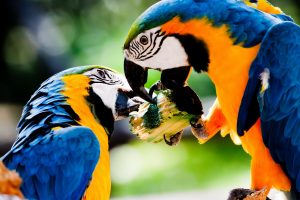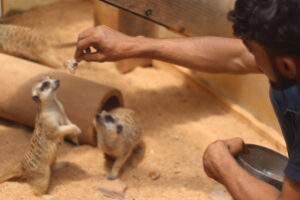MACAW WITH SPECIAL NEEDS
MACAW WITH SPECIAL NEEDS
BY SAI VARDEKAR
When compared to nature, survival in captivity is greatly improved due to propagation available for several aspects such as providing species specific needs, and treatment of ailments and rehabilitation. Sometimes, first-time parents are unable to successfully incubate or raise their babies. In this critical phase, we need to closely monitor egg-laying, incubation, and raising of babies. We learn so many different behaviours during this time. Some birds are naturally good at parenting whereas some require human intervention to aid in the early stages, and some actually

exhibit aggressive behaviours towards their own babies! When our blue and gold macaws (Ara ararauna) laid again, we had to deal with both a challenge and an accident. This is how it went down. By the end of October, this pair had laid 3 eggs. We found that all of them were fertile, and soon we’ll see chicks hatching out. After a few days, we saw that our chicks hatched out over the course of a week. I’m in charge of macaws in my zone, so I have to keep an eye on the nest boxes. The last chick we had hatched in early November. One day, as I was taking out the dishes in the evening, I heard a lot of noise. To find out what was going on, I went to check the nest box. I found the last two chicks, but one of them had a broken beak from the top to the bottom.

After consulting with my seniors, I took all the chicks for hand feeding and took extra care for the one with the broken beak. After giving it basic medicine and painkillers, we decided to hand-raise this chick with only half of its upper beak. Because this chick is so small, there can’t be any surgery on it. We called it Pointy and often wondered how it would live when it grows older. Pointy was
getting the same nutrition and formula as other chicks. Later, when the chick was about two months old, we started adding some papaya pulp and other fruits pulp to its formula. We also finely crushed some nuts into the formula to add some unique taste and help the bird get used to the taste it will have later when it is weaned. To our surprise, Pointy got used to all the flavours we gave him in the formula. Now that he was being weaned, we added papaya pulp to the formula and gave the other two chicks the weaning stage food, which was again papaya, apple, corn, and some parboiled sprouts. Pointy did a great job finishing the pulp we serve him every day. We also slowly added nut mix and other fruits, which he again liked. Fast-forward now, pointy learnt of crack open seeds from the side of this beak and eat without any issues!
He is now 3 months old and is growing beautifully.




